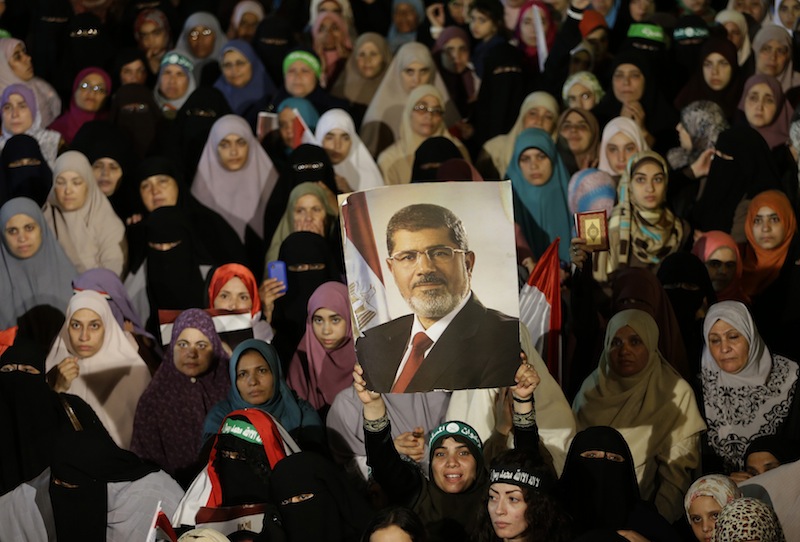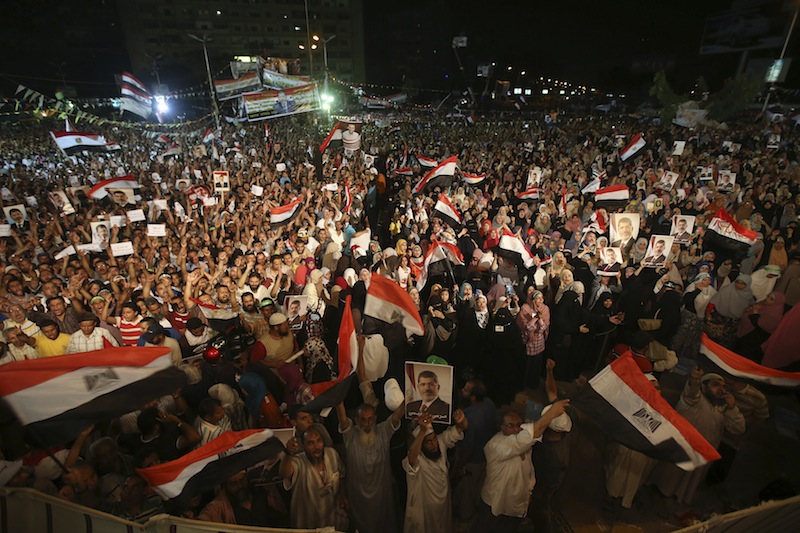CAIRO – It has been one week, and Egyptians don’t know the whereabouts of their former president. No longer the leader, nor a criminal defendant, Mohammed Morsi is being detained, along with at least seven of his top aides. The authorities promise, “He is in a safe place.” But safe where? They refuse to say.
Authorities have issued arrest warrants for hundreds of other Muslim Brotherhood members and supporters, including the group’s spiritual leader, known as the “supreme guide.” He and nine other senior Islamist officials were accused Wednesday of provoking the violence that led Egyptian security forces to fatally shoot more than 50 pro-Morsi demonstrators Monday.
The warrants come as authorities continue to round up the top leaders of the Muslim Brotherhood and its political arm, the Freedom and Justice Party, which held the office of president and several top ministries for 369 days before being toppled by last week’s military coup, which was backed by millions of demonstrators.
The mass arrests and the continued detention of Morsi and his aides constitute the type of behavior that the Obama administration has warned Egypt’s military leadership against. But the crackdown shows that Washington has been unable to exert much influence here since the generals proved they remain the nation’s pre-eminent force.
Morsi himself was accused of selectively using the judicial system to prosecute opponents, as was his predecessor, Hosni Mubarak, who was ousted in 2011. Now human rights advocates say Egypt’s new rulers may be doing the same.
“The biggest casualty of the last couple of years has been the idea of a neutral judiciary in Egypt, and in the last few days, that tradition continues,” said Heba Morayef, an Egypt researcher for the group Human Rights Watch.
Morayef said that in the Mubarak years, Muslim Brotherhood leaders were arrested for “membership in an illegal organization.” Now they are being arrested for allegedly inciting violence. “It is very clever,” she said, noting that there may be evidence to prove such charges in some cases but not in others.
A close relative of a top Morsi aide who disappeared on the night of the coup said the families of missing brotherhood leaders have been unable to contact their loved ones since.
“My brother was allowed a couple of phone calls over the past week, just to say ‘I am safe’ and ‘I’m OK,’” said the relative, who spoke on the condition of anonymity out of fear for the safety of those in detention. But when the relative pressed for more details, the answer was always, “I cannot say.”
“We don’t have any information where they are,” the relative said. “We don’t have any information on who’s detaining them. We don’t have an accurate account of the numbers.”
The relative also said that the families of the detained have received phone calls from men who the families think are working for Egyptian security services. “They have been threatening the families not to seek any international support,” the relative said.
Ahmed Aly, a spokesman for the country’s armed forces, said Tuesday that Morsi and his aides had been moved from the Republican Guard headquarters in Cairo, where their supporters believed them to be, to an undisclosed location.
Gehad el-Haddad, a Muslim Brotherhood spokesman, tweeted that the arrest warrants issued Wednesday were a “politically motivated” attempt to dismantle the running protests scattered across Cairo. Pro-Morsi demonstrators say they will continue their vigil until he is reinstated.
Egyptian officials denied that a crackdown on the Muslim Brotherhood is under way. “There are no exceptional measures being taken against any political force,” said Badr Abdelatty, a spokesman for the Ministry of Foreign Affairs. “Those who are using violence will be dealt with within the existing judicial system. Nothing more, nothing less.”
Egypt’s justice system allows for imprisonment without trial for up to six months under a provision that lets prosecutors slap any suspect with repeated 15-day detentions.
An official at the Interior Ministry said that although arrest warrants were issued Wednesday for the brotherhood’s supreme guide, Mohammed Badie, and his deputy, Mahmoud Ezzat, they were not yet in custody.
“This has to be done carefully,” said the official, who spoke on the condition of anonymity because he was not authorized to talk to foreign news media. He suggested that the police were not ready to wrest Badie and Ezzat from the arms of their supporters.
Badie and the others were wanted for “inciting violence” in connection with the Monday protest outside the Republican Guard headquarters that turned deadly, the official said.
The clash between the military and the Muslim Brotherhood has come as the country’s new civilian authorities have sought to project an air of normalcy. Interim President Adly Mansour on Tuesday appointed a new prime minister and vice president, and he outlined a path to quick elections, an amended constitution and a return to democracy.
Send questions/comments to the editors.




Success. Please wait for the page to reload. If the page does not reload within 5 seconds, please refresh the page.
Enter your email and password to access comments.
Hi, to comment on stories you must . This profile is in addition to your subscription and website login.
Already have a commenting profile? .
Invalid username/password.
Please check your email to confirm and complete your registration.
Only subscribers are eligible to post comments. Please subscribe or login first for digital access. Here’s why.
Use the form below to reset your password. When you've submitted your account email, we will send an email with a reset code.